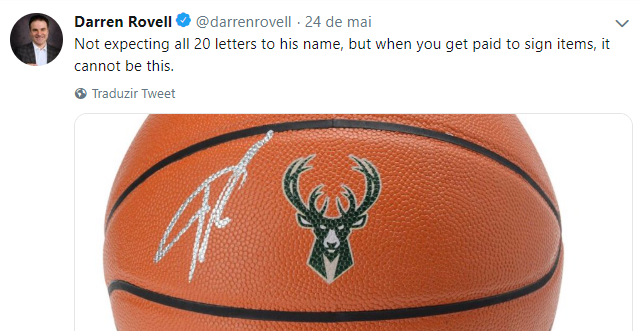
Credit: Darren Rovell (@darrenrovell) | Twitter
In 2018, the North American sports memorabilia market was measured for the first time. David Yoken, founder of the valuable card trading app “Collectable.com,” conducted the research that found the industry is worth $5.4 billion annually. Based on this, it is not surprising that Darren Rovell, a journalist and sports business expert, was extremely uncomfortable with a series of basketballs autographed by Giannis Antetokounmpo, a Milwaukee Bucks standout, offered for sale on the official website of the National Basketball Association (NBA).
On his personal Twitter account, Rovell, who has worked for media companies like ESPN and CNBC, posted: “Not expecting all 20 letters to his name, but when you get paid to sign items, it cannot be this.” He was referring, of course, to the athlete’s autograph, a scribble that did not allow identifying Antetokounmpo’s name. The hefty price of the five models of balls signed by the player varied between US$ 299.99 and US$ 449.99 – which alone would already justify the journalist’s post. However, a close look at the essence of this business reveals even more profoundly the mismatch between the target audience and the product offered.
Sports collectibles gives fans a tangible connection to the game they love. Displayed on a shelf or kept under lock and key, it works as a kind of comfort zone, associated with happy memories or the history of the game itself. Many times, these items are related to personal values, which can be the same ones that the consumer admires in teams or athletes. Acquiring them represents an approximation action – someone who pays dearly to extend a hand. And if the other side is willing to offer the hand back, this emotional scenario must be considered – which means, no coldness is allowed.
Maybe Antetokounmpo didn’t even pay attention to the sloppiness. Maybe someone showed up with the balls at a Bucks practice and asked the athlete to sign them. But the brands involved in this type of action must be aware of the delicate nature of what they propose to sell.
By: Thiago Peres, Journalist – PR Consulting Americas



